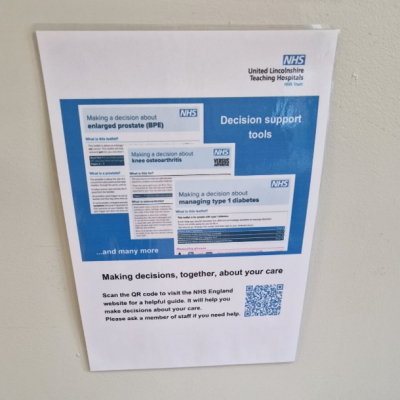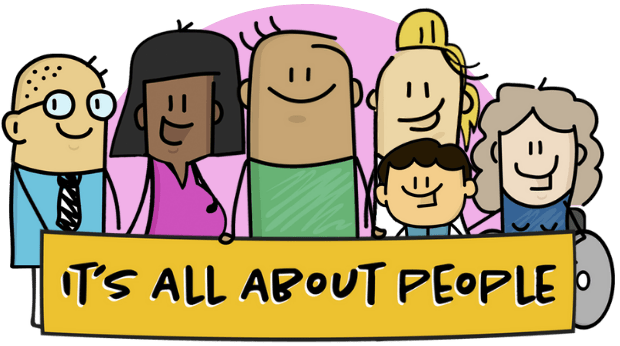Are you using Decision Support Tools?
The It’s All About People Personalisation Programme Team is committed to promoting people's choice and control over their health.
We want to see people accessing health and care services working in partnership with health professionals to make decisions together about their treatment and care.
To support this, we’ve been working with colleagues at United Lincolnshire Teaching Hospitals NHS Trust (ULTH) to promote the consistent use of Decision Support Tools (DSTs), also known as patient decision aids.

Have you spotted the Decision Support Tool posters in ULTH departments?
Published by NHS England, there are currently 22 tools available, each covering a different medical condition or stage of treatment.
Co-developed by clinical staff and people with lived experience, the tools support Shared Decision Making (SDM), a fundamental component of personalised care.
Decision support tools:
- help people and clinicians to work together to decide on the best course of action by ensuring the most up-to-date and evidence-based information is discussed.
- ensure that the person’s preferences and values are identified and included in the decision-making process. People are encouraged to consider what matters most to them in relation to the possible outcomes, including doing nothing.
The use of these tools is associated with people enjoying improved experiences and outcomes of care through personalised care approaches, and, with alternative treatment options made clear, can lead to fewer people wanting to proceed to surgical intervention.
When used by a clinical team skilled in SDM, these tools enhance, rather than replace, the clinical decision-making consultation, and, critically, ensure that patients are firmly at the heart of decision making.
DSTs in MSK
As part of our work to enhance experience of people with Musculoskeletal (MSK) conditions, we’ve been working to embed and promote the use of tools supporting Hip Osteoarthritis and Knee Osteoarthritis decision-making.
Both tools prompted an extremely positive response both from workforce colleagues, and from members of our MSK Co-production Group, who stressed how helpful the tools were.
“(The tools) would prevent a lot of unnecessary referrals. They also put the patient in the driving seat for their care.” Jody Blow, ACP Orthopaedics
A great start...but there's lots more to do!
Our conversations with health and care colleagues further confirm that they want better and more accessible shared decision-making information to give to people. This initial suite of 22 tools is as great start, but we also need to ensure they are accessible to those who would benefit from them.
This is why we’re working with health colleagues, leaders and the public to get the tools shared, used and having the desired impact.
We’re currently exploring how feasible it is for people to download and print the tools in waiting rooms, as they await their appointment.
We know the DST’s won’t work for everyone, but we believe that people with higher levels of health activation will use these tools and find them valuable. We can then tailor our work with service teams to support people who aren’t as skilled, confident or driven to manage their own health and care.

Have you found Decision Support Tools valuable?
If Decision Support Tools (DSTs) have been used to support your conversations with people, we’d love to hear from you.
- Have DSTs helped the decision-making process?
- Have they supported and enhanced your practice?
- And have they led to better experiences and outcomes for the people you support?
To share your DST experiences, contact us at lhnt.itsallaboutpeople@nhs.net







